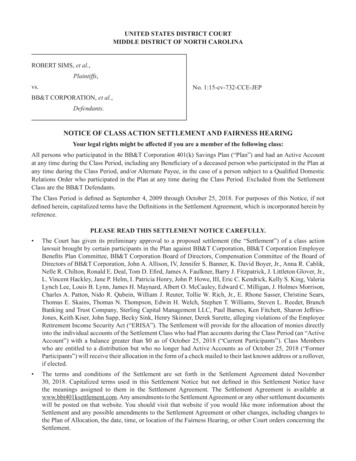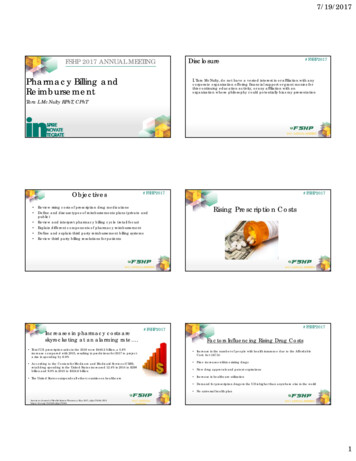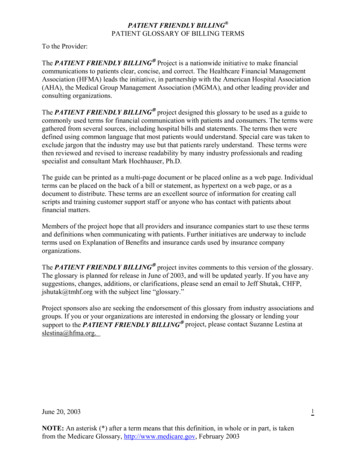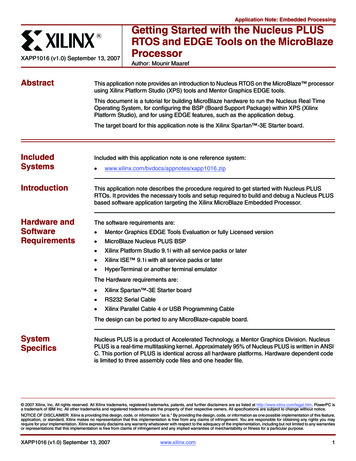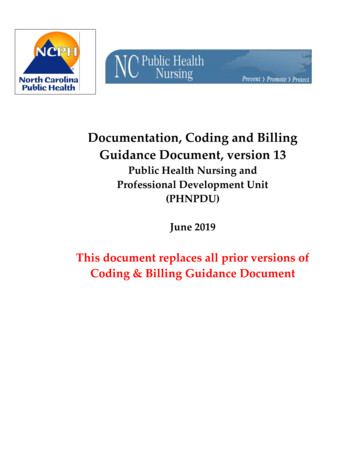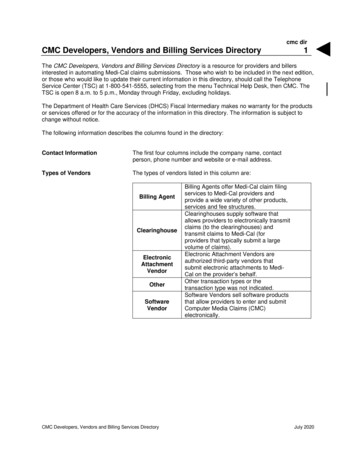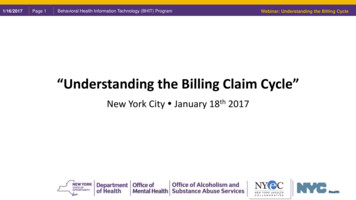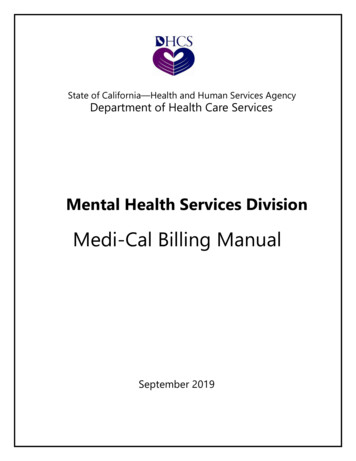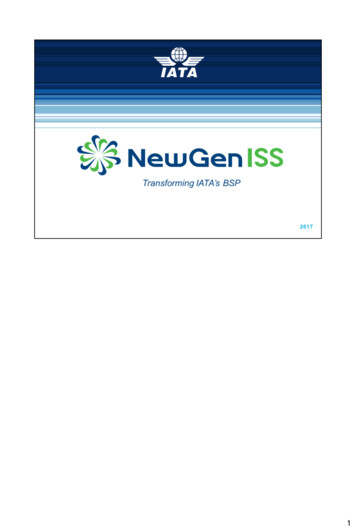
Transcription
1
Since its launch in 1971, IATA’s Billing and Settlement Plan (BSP) hassuccessfully facilitated the distribution and settlement of funds betweentravel agents and airlines safely and securely.However, the rules for the BSP were established in an era of paper ticketstock, brick-and-mortar travel agencies, limited payment methods and ahighly regulated airline industry. These rules no longer address the diverseand complex needs and risks of airlines and travel agents today.2
NewGen ISS is bringing the BSP settlement system into the modern worldby delivering simplified processes, lower costs, better protection of funds,new payment methods and a choice of agent accreditation models*.*IATA accreditation authorizes travel agents to sell international and/ordomestic tickets on behalf of IATA member airlines. It also allows access toIATA’s Billing and Settlement Plan (BSP) in countries where BSPs areoperational.3
The key initiatives under NewGen ISS are as follows:1. Agency Accreditation Models:The objective is to achieve a more relevant agency program and to facilitateagency participation through: A range of accreditation models that can better fit agent needs—not allagents are the same Introduction of a simplified set of rules2. Risk Management / Remittance Holding Capacity:In order to create a more secure environment, NewGen ISS introduces amore dynamic risk management where the agent’s risk profile determinestheir cash conditions. This includes the introduction of Remittance HoldingCapacity (RHC), or maximum threshold for agents’ outstanding monies atrisk.3. Introduction of a IATA EasyPay, a new payment method in the formof a pay-as-you-go e-wallet.4. Introduction of Global Default Insurance, an alternative financialsecurity to bank guarantees.4
The NewGen ISS framework distinguishes between the accreditationrequirements versus how the agent participates in the BSP, namely whichforms of payment are available to the agent.Agents will be able to choose the accreditation model most applicable totheir business, and then convert across models as their business evolves.How the agent participates in the BSP defines the level of associated riskand determines the applicable risk management conditions.GoLite (Standard Accreditation – No Cash Facility) A new simplified accreditation for agents who do not require a cash facilityand will issue tickets only via IATA EasyPay or credit card. Since there is notthe same related risk of default, the agent will have limited financialrequirements beyond the obligation to provide a minimal financial security tocover the risk associated with credit card sales and ADMs.GoStandard (Standard Accreditation with Cash Sales) This option resembles most closely accreditation as it exists today. The keydifferences are the introduction of IATA EasyPay as a new form of payment,and the implementation of a Remittance Holding Capacity for agents’ BSPcash sales*.5
GoGlobal (Multi-Country Accreditation) This will offer agencies operating in multiple BSPs a simplifiedaccreditation and risk management process. The agent will meet one set ofglobal requirements in compliance with any local legal requirements. Theentire agent group would be subject to an aggregated Remittance HoldingCapacity and, if required, the parent would also provide financial securitycovering the sales of all its locations.*Cash sales are ticket sales in which the travel agent receives paymentdirectly from the passenger (by any method the agent allows). The agentholds those monies in trust on behalf of the airline until an establishedremittance date, when the funds are remitted to the BSP and then from theBSP to the airline. Card sales are ticket sales on the customer’s credit card,processed on the merchant agreement of the airline. Payment is receiveddirectly by the airline from the applicable credit card processor.5
Agents may choose to participate in the BSP with or without a cash facility.Only those agents participate with a cash facility will be required to undergoa financial assessment.The new risk management framework will operate under the following keyprinciples: The criteria applicable to perform the financial assessment of travelagents will be related to the accreditation model the agent has selected. The historical performance of the agent in the BSP related to its ability topay and capacity to comply with financial requirements will be factoredinto the applicable risk management conditions. All agents that choose to participate in the BSP with a cash form ofpayment (i.e. ability to issue cash sales) will have a monetary limit to cashsales or ‘Remittance Holding Capacity’ (RHC). The applicable RHC will becalculated based on the agent’s risk status, historical BSP cash turnoverand remittance frequency.6
With NewGen ISS, IATA is establishing a Remittance Holding Capacity(RHC) for all agents with access to a cash facility. In real-time, IATA will thenmonitor agents outstanding cash sales versus the established threshold.When an agent reaches its RHC, BSP cash sales will be restricted until aremittance is received and the agent again falls below the maximumthreshold.Agents will be notified when they reach a certain percentage of theircapacity (50%, 75% and 90%), so as to be able to take applicable actions.Importantly, the agent can continue issuing tickets using IATA EasyPay orthe customer’s credit card as the form of payment.In addition, the agent can remit monies to the BSP in advance of theremittance date to re-open the related capacity. Furthermore, by providingadditional financial security, an agent can increase their RHC.Similar rules have been established in other industries for companies sellingtheir products and services through a distribution network, this is not uniqueto the air industry.7
8
IATA EasyPay is a voluntary alternative payment system for travel agents toissue tickets through the BSPs.Among other benefits, IATA EasyPay will: Provide a “pay-as-you-go” solution for agents Be economical, with a low cost per transaction ( 0.53 USD) Provide an additional payment method, not replacing any of theexisting onesIATA EasyPay is currently live and being piloted in Norway, Iceland, Finlandand Sweden with additional markets to follow.9
Global Default Insurance (GDI) is a new type of financial security option. It isnot intended to replace or exclude other security types, such as local defaultinsurance programs (DIPs).IATA has established the framework for introduction of this additionalfinancial security type, but IATA is not the one providing insurance. Pricing isset directly between the Insurer and the Agent.The objective is that for agents, Global Default Insurance will present a costeffective and flexible alternative to bank guarantees and other types ofsecurity.For airlines, the objective is for the insurance solution to provide strong andreliable coverage with certainty of claims in the event of a default.GDI has been launched in over 20 markets and will be progressively rolledout across all BSPs by the end of 2018.10
In sum, NewGen ISS offers both travel agents and airlines options andbenefits not available under the existing structure.11
The current landscape for payment services has changed dramatically overthe past years, and new players and payment solutions are emerging whichoffer travel agents new options to remit customer funds to airlines.This was addressed at the 2017 PAConf through the launch of an industryinitiative called Transparency in Payments (TIP).12
IATA has worked with key industry stakeholders including airlines, travelagent representatives and GDSs in the creation of TIP.The objective of TIP is to introduce a global industry initiative focused onproviding airlines and travel agents with: An increased transparency and control for each player, An efficient framework and tools to enable travel agents andairlines to bilaterally agree on usage of alternative transfer methods(such as agent’s cards / agent’s VANs) for travel agency sales A resolution framework which is adapted to regulatory and marketconditions13
The TIP framework for BSP sales is based on four key principles: The first principle is Transparency: providers of AlternativeTransfer Methods will need to enlist with IATA, and provide relevantinformation about their products by enrolling their products.Travel agents and airlines will have access to this information The second principle is Individual airline consent: eachindividual airline will have the possibility to review enrolled productsand provide its individual consent to accept or not AlternativeTransfer Methods. This consent can be done at different levels ofgranularity (by country, enrolled product and agent) depending onairline’s commercial and legal policy The third principle is Transaction validation and monitoring.To ensure that the TIP framework works soundly, there will be twosteps of validation. First, upfront validation whereby the airline consent ischecked before the ticket is issued Then post-ticketing monitoring This means that all BSPtransactions will be monitored by IATA after ticket issuancein order to detect potentially non-compliant transactions andreported to each airline The fourth and last principle is related to Infringement andconsequences. In case of infringement to their consent policy,14
airlines will follow up directly with the travel agents on a bilateralbasis. If there is a pattern of abuse, the case will be brought to theTravel Agency Commissioner, who is a neutral arbiter created byResolution of the Passenger Agency Conference and supportedby IATA Member airlines and travel agency association memberswho sit on the Passenger Agency Program Global Joint Council,providing oversight relevant to airline and travel agencyrelationships.14
TIP will provide airlines with: Resolution framework to ensure transparency and control for eachindividual airline Tools to manage airline consent policy Tools and reports to monitor compliance with each airline’s consent policyTIP will provide travel agents with: Resolution framework to provide access to alternative transfer methods,based on airline individual consent Tools to manage the enrolment of an agent’s own card, and consult theairline consent list15
Pilots of the NewGen ISS initiatives are underway in a first set of pilotmarkets.In November, the Passenger Agency Conference (PAConf) adoptedResolution changes which will allow the implementation of NewGen ISS andTransparency in Payments effective from March 1 2018.Starting from then, NewGen ISS and TIP will progressively roll out in wavesto all BSPs worldwide. This is expected to take approximately 2 years.16
17
covering the sales of all its locations. *Cash sales are ticket sales in which the travel agent receives payment directly from the passenger (by any method the agent allows). The agent holds those monies in trust on behalf of the airline until an established remittance date, when the funds are remitted to the BSP and then from the BSP to the .

